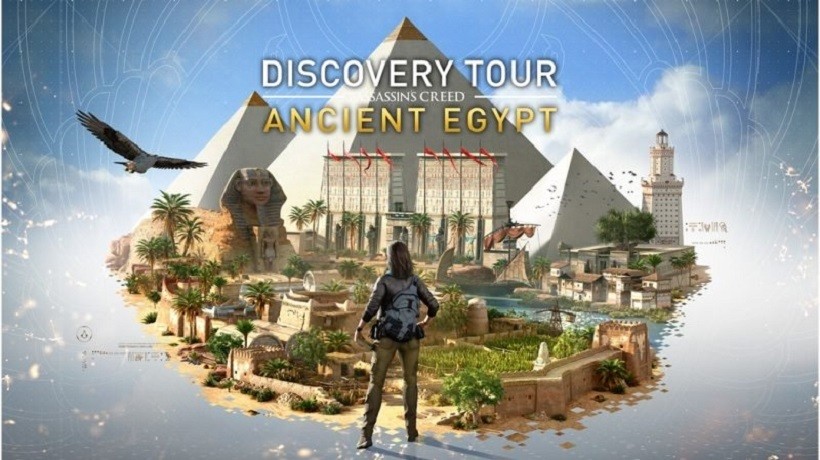Is The High-End Gaming Industry Here To Save The Day For Low Cost Educational Gaming?
Ubisoft has created an experience in Assassin's Creed Origins called Discovery Tour Ancient Egypt. This new experience will be offered both as an addition to the existing game Assassin’s Creed Origins, and in context of this story more noteworthy as a standalone experience available on PC (no gaming console required).
This means you (any ‘you’, not just gamers) can freely explore or take guided tours in Egypt that are worlds above what a typical educational production company can offer.
The price of this standalone product is $19.99, significantly less than that of the full game (typically $59.99), and is available via Steam and Uplay. GameSpot.com points out:
“These virtual landscapes are the product of exhaustive research and meticulous attention to detail so, for many, Assassin’s Creed is as much about learning history as it is sticking bad guys with wrist blades. For Assassin’s Creed Origins, Ubisoft has taken a step further into presenting the game as a learning tool.”
Enemies and missions are replaced with exploration and education, providing an entirely new experience. Polygon.com notes:
“With the removal of combat and objectives, Discovery Tour becomes accessible to, well, everyone.”
It’s an experiment that has the potential to lower the bar of intimidation for non or casual gamers who may otherwise miss out on this new avenue for experiential learning.
Learning By Playing
Ubisoft just may have opened the door for all video game publishers to reimagine how they can leverage the worlds they have created and repurpose them for educational endeavors. Hey Ubisoft, if you continue down this road there’s a world of Instructional Designers that would be happy to help you ensure the learning experiences are not only engaging, but also effectively transferring knowledge. I…am…available. Please call. No seriously, call me!
It sounds like they’re already on the right path as Gamespot.com notes Ubisoft has “…already tested Discovery Tour in classroom environments and found that it was useful in helping students learn about ancient Egypt.” (However, what metrics they used to assess this is unknown.) And since the goal isn’t as a full learning replacement, this may be fine. Polygon.com noted “…they only ever conceived of it as a supplement to teacher-guided education.” However, all involved can benefit if the school adopters take a serious approach to measuring change in performance from using this tool.
Having a realistic environment to put a ‘player’ in is one thing, but what is the experience like? Dropping someone into a virtual ancient Egyptian environment isn’t enough to cut it, and that’s not what is happening here. Polygon.com explains more about how the tours in Discovery Tour will work:
“The tours take the form of a series of points on a glowing, golden path. At each point, a voice-over narrates a brief database entry. These entries are often paired with visual elements, like historical frescoes or modern recreations, such as the watercolor paintings of the French architect and researcher Jean-Claude Golvin.”
In addition to what you’re doing, is ‘who’ you get to do it as. This adds a level of depth to the role-playing of the experience. Polygon.com notes:
“What strikes me as awesome is that students coming into this mode can explore Egypt through so many avatars, including children and many women.”
There are also daily life activities included, offering an incredible level of detail that I feel the training world sometimes misses out on. It is those little details that can add that extra layer of immersion that is so critical if you want to transfer an experience into a true understanding (thus succeeding in training success). Polygon.com notes an example of how a player can stop to bake bread:
“..the player can get a first-person look at the bread-making process. This involves putting dough in molds and placing them in a stone kiln, then removing the cooked bread molds with tongs. …I loved the way it illuminated the subtle details of the world.”
The little details can make all the difference sometimes whether in translating an experience or in explaining steps in a process. In the case here with bread-making, it's a little of both, the simple addition of this activity brings players into a more true understanding of what daily life encompassed, but It also goes deep enough to provide a proper training on 'how' this was done.
Getting From Point A To Point B
So often, I see in training where a Subject Matter Expert has glossed over the finer details of the steps needed in a process and with the lack of an Instructional Designer to catch it, the end user stands confused at how they are supposed to get from point A to point B. (Insert your own personal frustrating IKEA or other company building experience here.)
In the bread example, it's the putting the dough in the mold part that I'm impressed to see, that shows me that A) not only did they think to put this daily life activity of bread-making in the experience, but B) they are showing a more granular process to make sure you fully understand what was involved to 'make' bread.
When learning any topic, ensuring that we catch the "curse of knowledge" that sometimes effects our Subject Matter Experts is key to helping ensure our learners (who are new to a topic) get the step by step of a process that they need. If the bread-making experience simply had you walk up to a stand and say press X to make bread and then poof, you got a loaf of bread, what did you really learn about the process there? Are you going to walk into your kitchen and press X to make a loaf of bread for yourself one day?
Just as with good training, there's a balance between finding the right amount of information that helps someone be able to perform a task in real life and not overloading them with extraneous 'nice to know' information. I'm hopeful from what I can see so far that Ubisoft may be striking that balance here.
Let’s say some history teachers buy into this and purchase this.
What does each of the following gain?
- The school: Gains a high-quality affordable option for experiential education. The school also has an opportunity to assess how this new experience may assist in knowledge transfer (if measured accurately).
- The students: Gamers will likely be engaged and more interestingly our group of casual or non-gamers will be exposed to and benefit from this experience.
- The publisher and developer: Gain the potential for a new revenue stream and the possibility of attracting new fans to their associated Assassin’s Creed series.
In 2007 I wrote a story in the book Gadgets, Games, and Gizmos for Learning: Tools and Techniques for Transferring Know-How from BOOMERS to GAMERS. In this piece, I called out how interactive entertainment like gaming is a great multi-sensory tool that has the underappreciated potential to allow you to more impactfully experience a topic vs a traditional lecture because you are now a part of it. It's 2018 now and here we have a very polished sounding dedicated endeavor to provide this experience.
Part of the process of a needs analysis is finding what tools are already available to help you train a topic. Sometimes this is a compromise on quality. However, in this case, we’re seeing the opposite: the absolute height of technical achievement, made available unlike anything close to what can be created on our own. While ancient Egypt isn’t what everyone is concerned with educating on, it’s the future potential for where this can go that has me excited.
With Assassin’s Creed Origins, Ubisoft has made an incredibly rich detailed historical world (something other games have also done), but with the addition of Discovery Tour they are breaking new ground by providing the stand-alone Discovery Tour experience. Ubisoft’s goal is to “make history everyone’s playground…and make ancient Egypt accessible to a broader audience.”
I, and the gaming industry if they are smart, will be closely watching to see how this plays out.
References:
- Assassin's Creed Origins: Discovery Tour Is A Smart, Exciting Way To Explore Game Worlds
- Discovery Tour Shows a Different Side of Assassin's Creed Origins' Egypt
- Assassin’s Creed Origins’ Discovery Tour lets the beauty of Egypt shine









